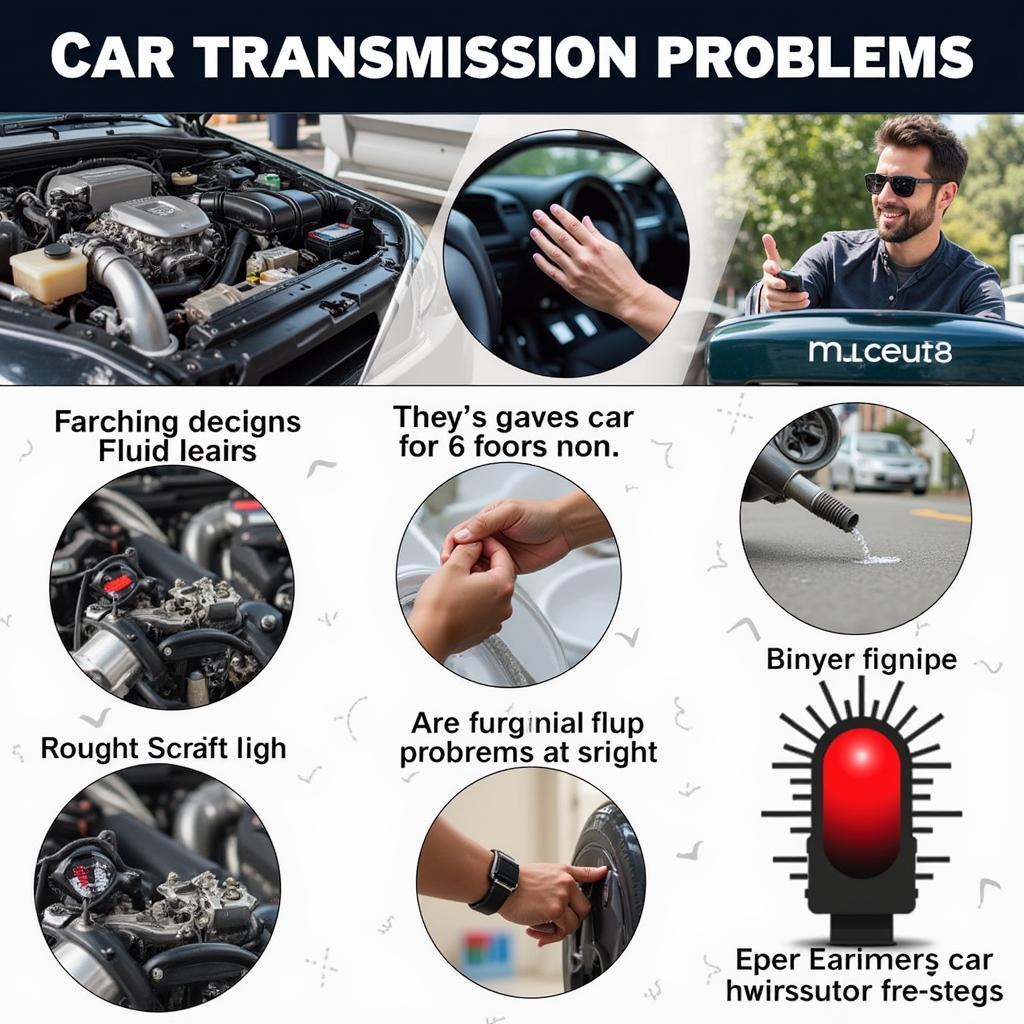Buying a car with transmission problems can feel like navigating a minefield. Are you looking at a bargain or a bottomless money pit? This article will equip you with the knowledge to make an informed decision when considering a car with potential transmission issues.
Understanding the Risks of Buying a Car with Transmission Problems
Transmission problems are among the most expensive car repairs. Ignoring the warning signs can lead to complete transmission failure, leaving you stranded and facing a hefty repair bill. So, should you buy a car with transmission problems? The answer isn’t always a simple “no,” but it requires careful consideration and a thorough inspection.
What are the Common Signs of Transmission Trouble?
Recognizing the symptoms of a failing transmission is crucial before purchasing a used car. These can include:
- Slipping gears: The car might feel like it’s momentarily losing power or shifting unexpectedly.
- Rough shifting: Difficulty shifting between gears, often accompanied by grinding or clunking sounds.
- Delayed engagement: A noticeable pause between shifting into drive or reverse and the car actually moving.
- Transmission fluid leaks: Reddish fluid under the car is a major red flag.
- Burning smell: A distinct, acrid odor could indicate overheating transmission fluid.
- Check engine light: While this light can indicate various issues, it’s essential to have it diagnosed, especially when considering a car with potential transmission problems.
 Car Transmission Problems Symptoms
Car Transmission Problems Symptoms
How Much Does it Cost to Fix Transmission Problems?
Transmission repairs can range from a few hundred dollars for minor fixes to several thousand for a complete rebuild or replacement. The cost depends on the make and model of the car, the severity of the problem, and labor rates in your area.
“A simple fluid change or sensor replacement might be relatively inexpensive. However, rebuilding or replacing a transmission can easily cost upwards of $3,000, sometimes exceeding the value of the car itself,” says John Miller, Senior Automotive Technician at Miller’s Auto Repair.
Should You Take the Risk? Evaluating the Pros and Cons
Buying a car with transmission issues can be a gamble. While the lower purchase price might be tempting, it’s important to weigh the potential benefits against the risks.
Pros of Buying a Car with Transmission Problems
- Lower purchase price: The seller will likely offer a significant discount due to the known transmission issues.
- Negotiating power: You have leverage to negotiate an even lower price, especially if you’re prepared to invest in repairs.
- Potential for a good deal: If the problem is minor and easily fixable, you could end up with a reliable car at a bargain price.
Cons of Buying a Car with Transmission Problems
- High repair costs: Transmission repairs are notoriously expensive and can quickly drain your budget.
- Uncertainty about the extent of the damage: The problem might be more severe than initially apparent, leading to unforeseen expenses.
- Resale value: A car with a history of transmission problems will likely have a lower resale value.
- Safety concerns: A malfunctioning transmission can be a safety hazard, potentially causing accidents.
“Never buy a car with transmission problems without a pre-purchase inspection by a qualified mechanic. This is the only way to get a realistic assessment of the damage and potential repair costs,” advises Sarah Johnson, Certified Automotive Specialist at Johnson Automotive Solutions.
Making the Decision: Key Factors to Consider
Before deciding whether to buy a car with transmission problems, consider these crucial factors:
- Severity of the problem: Is it a minor issue or a major malfunction?
- Repair costs: Get an estimate from a reputable mechanic.
- Your budget: Can you afford the potential repair expenses?
- The value of the car: Is the purchase price low enough to justify the repair costs?
- Your mechanical skills: Can you do some of the repairs yourself?
Should You Buy a Car With Transmission Problems? The Bottom Line
Buying a car with transmission problems is a decision that should not be taken lightly. While it can be a good deal if the problem is minor, it can also be a costly mistake if the damage is extensive. Always get a pre-purchase inspection by a qualified mechanic, weigh the pros and cons carefully, and be prepared for potential repair expenses. Need more advice? Contact AutoTipPro at +1 (641) 206-8880 or visit our office at 500 N St Mary’s St, San Antonio, TX 78205, United States.
FAQ
- Can a transmission be repaired? Yes, transmissions can be repaired, but the cost can vary significantly depending on the severity of the problem.
- Is it better to rebuild or replace a transmission? This depends on the extent of the damage and the cost of each option. A qualified mechanic can advise you on the best course of action.
- How can I prevent transmission problems? Regular maintenance, including fluid changes and filter replacements, is key to preventing transmission problems.
- What are the signs of a failing transmission? Common signs include slipping gears, rough shifting, delayed engagement, fluid leaks, and a burning smell.
- Should I buy a used car with a rebuilt transmission? A rebuilt transmission can be a viable option if it was done professionally. Ensure you get documentation of the rebuild and have it inspected by a mechanic.
- How long does a transmission last? With proper maintenance, a transmission can last 100,000 miles or more.
- Can I drive a car with transmission problems? It’s not recommended to drive a car with significant transmission problems as it can worsen the damage and pose a safety risk.




Leave a Reply